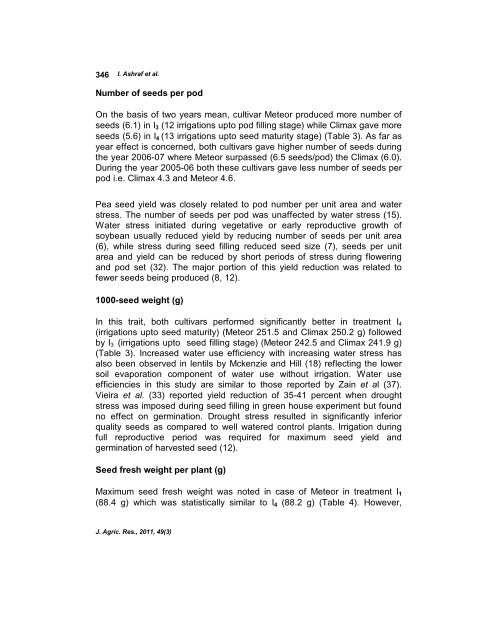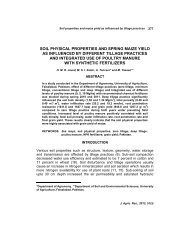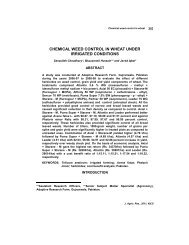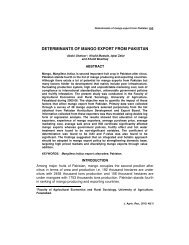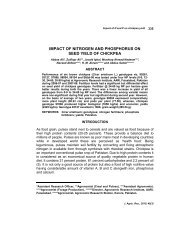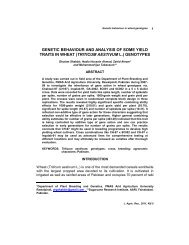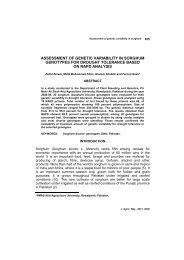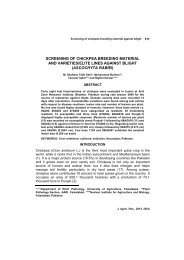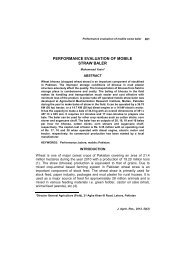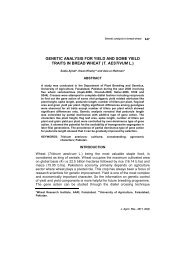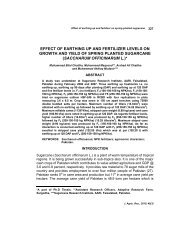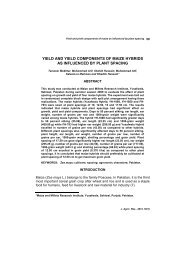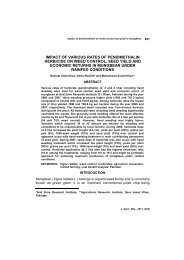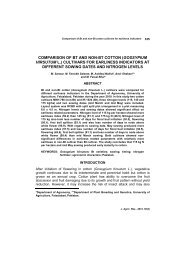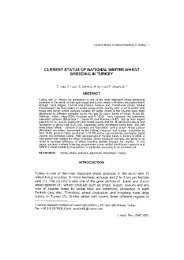Effect of varying Irrigation Frequencies on Growth, Yield and Quality ...
Effect of varying Irrigation Frequencies on Growth, Yield and Quality ...
Effect of varying Irrigation Frequencies on Growth, Yield and Quality ...
- No tags were found...
You also want an ePaper? Increase the reach of your titles
YUMPU automatically turns print PDFs into web optimized ePapers that Google loves.
346<br />
I. Ashraf et al.<br />
Number <str<strong>on</strong>g>of</str<strong>on</strong>g> seeds per pod<br />
On the basis <str<strong>on</strong>g>of</str<strong>on</strong>g> two years mean, cultivar Meteor produced more number <str<strong>on</strong>g>of</str<strong>on</strong>g><br />
seeds (6.1) in I 3 (12 irrigati<strong>on</strong>s upto pod filling stage) while Climax gave more<br />
seeds (5.6) in I 4 (13 irrigati<strong>on</strong>s upto seed maturity stage) (Table 3). As far as<br />
year effect is c<strong>on</strong>cerned, both cultivars gave higher number <str<strong>on</strong>g>of</str<strong>on</strong>g> seeds during<br />
the year 2006-07 where Meteor surpassed (6.5 seeds/pod) the Climax (6.0).<br />
During the year 2005-06 both these cultivars gave less number <str<strong>on</strong>g>of</str<strong>on</strong>g> seeds per<br />
pod i.e. Climax 4.3 <strong>and</strong> Meteor 4.6.<br />
Pea seed yield was closely related to pod number per unit area <strong>and</strong> water<br />
stress. The number <str<strong>on</strong>g>of</str<strong>on</strong>g> seeds per pod was unaffected by water stress (15).<br />
Water stress initiated during vegetative or early reproductive growth <str<strong>on</strong>g>of</str<strong>on</strong>g><br />
soybean usually reduced yield by reducing number <str<strong>on</strong>g>of</str<strong>on</strong>g> seeds per unit area<br />
(6), while stress during seed filling reduced seed size (7), seeds per unit<br />
area <strong>and</strong> yield can be reduced by short periods <str<strong>on</strong>g>of</str<strong>on</strong>g> stress during flowering<br />
<strong>and</strong> pod set (32). The major porti<strong>on</strong> <str<strong>on</strong>g>of</str<strong>on</strong>g> this yield reducti<strong>on</strong> was related to<br />
fewer seeds being produced (8, 12).<br />
1000-seed weight (g)<br />
In this trait, both cultivars performed significantly better in treatment I 4<br />
(irrigati<strong>on</strong>s upto seed maturity) (Meteor 251.5 <strong>and</strong> Climax 250.2 g) followed<br />
by I 3 (irrigati<strong>on</strong>s upto seed filling stage) (Meteor 242.5 <strong>and</strong> Climax 241.9 g)<br />
(Table 3). Increased water use efficiency with increasing water stress has<br />
also been observed in lentils by Mckenzie <strong>and</strong> Hill (18) reflecting the lower<br />
soil evaporati<strong>on</strong> comp<strong>on</strong>ent <str<strong>on</strong>g>of</str<strong>on</strong>g> water use without irrigati<strong>on</strong>. Water use<br />
efficiencies in this study are similar to those reported by Zain et al (37).<br />
Vieira et al. (33) reported yield reducti<strong>on</strong> <str<strong>on</strong>g>of</str<strong>on</strong>g> 35-41 percent when drought<br />
stress was imposed during seed filling in green house experiment but found<br />
no effect <strong>on</strong> germinati<strong>on</strong>. Drought stress resulted in significantly inferior<br />
quality seeds as compared to well watered c<strong>on</strong>trol plants. <str<strong>on</strong>g>Irrigati<strong>on</strong></str<strong>on</strong>g> during<br />
full reproductive period was required for maximum seed yield <strong>and</strong><br />
germinati<strong>on</strong> <str<strong>on</strong>g>of</str<strong>on</strong>g> harvested seed (12).<br />
Seed fresh weight per plant (g)<br />
Maximum seed fresh weight was noted in case <str<strong>on</strong>g>of</str<strong>on</strong>g> Meteor in treatment I 1<br />
(88.4 g) which was statistically similar to I 4 (88.2 g) (Table 4). However,<br />
J. Agric. Res., 2011, 49(3)


